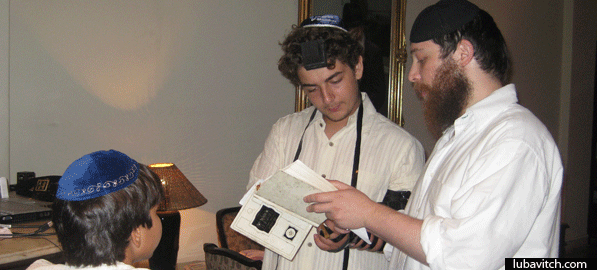Rabbi Chanoch and Leah Gechtman are the newly named Chabad representatives to Mumbai. Before details of their appointment were made public, they shared a candid conversation with Baila Olidort, Editor-in-Chief of Lubavitch.com/Lubavitch News Service, about their decision to accept this appointment.
Editor: You were both leading busy lives in Israel, working as Shluchim, when you were approached by members of Lubavitch Headquarters concerning Mumbai.
Rabbi Chanoch Gechtman: Yes, we weren’t looking for another position. My wife and I were working as Shluchim in Gadera, where my in-laws have a busy Chabad center with 200 people on a regular Shabbat. So when we were approached about Mumbai, several months after the attack, we dismissed the idea.
Editor: Why do you think you were asked to take the assignment?
Chanoch: As a rabbinical student, I spent time in Mumbai helping the Holtzbergs. Gabi was a dear friend, and I knew Mumbai and the community. But after five months there, I knew I’d never want to live there. It’s not an easy place.
Editor: What made you warm up to the idea?
Chanoch: We were approached numerous times about it, and at some point, I began to think that maybe it deserves at least some thought. But until my wife would have a chance to visit Mumbai and get to know the place, it really wasn’t relevant.
Leah Gechtman: At first I wouldn’t hear of it. But then it occurred to me that if the Rebbe was alive and would ask us to take the assignment, we would be honored. That changed my way of looking at it, and I began to consider it.
Editor: In the summer of 2009 you both made a trip to Mumbai with your baby.
Chanoch: Yes, I already knew the place, but I was very concerned about how my wife would perceive it—the poverty on the streets, the odors, the heat can be shocking. But in fact we were pleasantly surprised because we were staying in a location that was quite different from Colaba where Nariman House is—much cleaner and more residential.
Editor: You aren’t going to be moving into Nariman House.
Chanoch: No, that’s going to remain a visitor center. A kind of memorial to the life that Gabi and Rivki lived there.
Leah: We got such a warm reception from the local people and many of the visitors who frequented the Chabad House. A group of students, some of them who knew the Holtzbergs well, were so eager to welcome us. They were still reeling from the tragedy—and they let us know how much they wanted us to move there permanently.
Editor: That was only a few months after the Holtzbergs were killed.
Leah: The trauma was still fresh on everyone’s mind, and every evening around the table people referred to how things were. But I expected that. A lot of these people had grown with Gabi and Rivki and wanted to see things done as they had done them.
Editor: Do you feel beholden to the way they did things?
Chanoch: We feel beholden as Shluchim of the Rebbe. But we obviously want to continue the work that Gabi and Rivki did in Mumbai. Gabi was unusual in the way he drew people who were just hanging out in the Chabad House, into the study of Torah—he managed to do that at every opportunity—pulling out a Tanya while sharing a cup of coffee with a visitor, a businessman, a traveler, and before you knew it, people came around the table and Gabi got everyone to learn a little. And he did it all with such gentleness.
Editor: What were your feelings when you returned to Israel after summer in Mumba.
Leah: That I can have a life here. It will take getting used to. The living conditions are much more difficult than what we are used to. Here in Israel we spend a lot of time outdoors. In Mumbai, we can go for weeks staying indoors because of the heat and the polluted air. Getting around—transportation, is also complicated. And then there’s the matter of security—but we’re working on that.
I love the life I have here in Israel, living near my family. I will miss that. But I’ll find fulfillment in my life in Mumbai.
Editor: How do the circumstances of this appointment affect you?
Leah: When the terror attacks happened, I was pregnant, so I did not want to follow the story in detail, and so I never exposed myself to the worst of it. When we began talking about moving to Mumbai, I put all these thoughts into an “envelope.” I haven’t gone to the Nariman House. I don’t allow myself to think about it. It’s one way of dealing with this—maybe not the best, but I want to focus on life, I want to be active and effective. And there is so much to do in Mumbai.
Editor: What are you planning to focus on when you get settled?
Leah: There are many areas that I want to explore and to get involved in. There are lots of young people who live here and there’s no formal Jewish educational program for them. And there are so many really poor local Jewish families—
Chanoch: Yes, that’s a big one. I am hoping that eventually we will establish a support center dedicated to the immediate needs—food, medicine, financial assistance—of the local Jewish community. I can see us developing a range of educational courses and classes and social activities that would help people here build a higher quality of life for themselves, and enrich their day-to-day existence.
To support the rebuilding of Chabad of Mumbai, click here

Be the first to write a comment.